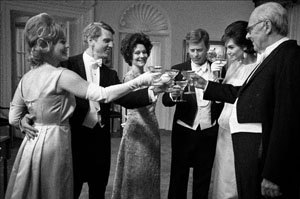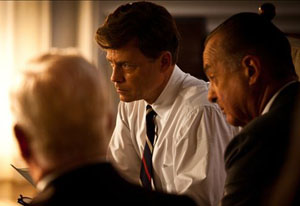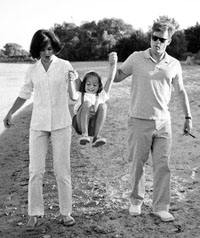Dan Snow's toxic trilogy climaxed in New York, where he crawled voyeuristically through the rotten core of the Big Apple. It was part Discovery Channel documentary, part Gangs of New York dirty realism, as Snow took a frankly indecent relish in regaling us with tales of death, disease and raw capitalism at its baby-eating worst.

I made the mistake of catching up with the darkly sumptuous The Crimson Petal and the White just before knuckling down to review this new two-part drama, and it was like moving from fine vintage wine to warm supermarket-brand lager. To begin with, I couldn’t dissociate Ashley Jensen from her perky but dim character in Extras, so the moment she found herself confronted with a game-show-from-hell scenario of committing a murder in return for five million quid, I expected Ricky Gervais to pop up in the next scene, giving her wisecrack-littered advice on what to do next.

Captain Scott's doomed 1910-1913 expedition to the South Pole has become one of the enduring myths of the later British Empire, a paradigm of pluck, grit and a refusal to surrender in the teeth of hideous odds. Subsequently, some historical revisionists have reached a different conclusion, that Scott was in fact an ill-prepared amateur who committed a string of fatal errors.

So Monroe reached the end of series one, and I still couldn't read what its tone was supposed to be. Some artsdesk readers have expressed enthusiasm for the theme tune, but I find its jogging Celtic jauntiness symptomatic of Monroe's wider problems. Obviously you can't expect too much from a bit of title music, but surely it should give you a clue as to whether the show is a hard-hitting drama about life and death or a sitcom?

I prefer "living room", but I have a friend who insists on "lounge". For some reason that probably goes deep into the psyche, I cringe at "sitting room". Same goes for "front room". As for "reception room", I’ve only ever seen that in the windows of estate agents. "Parlour", too, is a rarity, confined now to TV period dramas, which is exactly where "drawing room" seems to be heading (or perhaps I’m not mixing in the right circles). And anyone who calls it a "dining room" should surely be consigned to lonely TV dinners in perpetuity.

The talent show search - not for another star but for another field to devour - has reached its logical conclusion. Whereas most such shows - The X Factor, for example - are ostensibly about one skill or another as a pretext for marketing, Britain's Next Big Thing last night on BBC Two was a talent show about finding a merchandising opportunity. Artisans were given the chance to pitch their products to major chains, and the first episode was set at Liberty (not Libertys, as most called it).

In 2004 Michael Collins wrote a fascinating book, The Likes of Us: A Biography of the White Working Class. It was part memoir of his south-London childhood, part history of the area and part polemic. Two-thirds was an excellent read, a thoroughly researched and well-written account of the many generations of his family who had lived in Walworth, but the last third was a confused mess of an argument about what he saw as the plight of the modern-day white working class - marginalised and despised by the middle-class media and forgotten by the establishment. I had a similar response to this programme; it was meticulously researched and engagingly presented, but had at its heart a deeply flawed conclusion.


It's unlikely that this soap-esque miniseries about America's most notorious political clan will stir up the kind of furore in Britain that has engulfed it in the States. Over there, merely to mention the Kennedys seems to conjure up visions of a lost Eden (well, Camelot) in which America stood square-jawed against the Russians, won the race to the moon and policed the planet with its colossal Arsenal of Democracy. Add in the horrific assassinations of JFK and his brother Bobby and the obliteration of all that glamour and promise, and it's a great shining myth that even Hollywood has never adequately captured.
It hasn't captured it here either, but the early signs are that The Kennedys is a hugely watchable political Dallasty, even if you could spend a lively evening at the absinthe, quibbling over casting or what's been left out. Certainly it doesn't look like the right-wing hatchet job it's been accused of being, and it's hard to understand how it has managed to polarise American reviewers like a boxing match between Obama and Sarah Palin ("a ham-fisted mess" according to The Hollywood Reporter, but "one of the most riveting, accurate historical dramas ever on TV" in the opinion of the New York Post).
Plenty of brickbats have been aimed at Katie Holmes for her portrayal of Jackie Kennedy, whom she manages to resemble fairly closely. But I thought she made a decent stab at portraying the former Jacqueline Bouvier's naive infatuation with the young Senator John Kennedy (usually known as Jack), angrily dismissing her mother's warnings that he'd merely treat her as a plaything and then throw her aside. As it turned out, mother knew best. We saw Jackie first dutifully playing the decorative political wife for the cameras, then watched it all turn sour as she threatened to divorce her philandering husband. True to form, Jack's bullying father Joe tried to bribe her out of doing anything so rash, or, more to the point, so politically damaging (the Kennedys celebrate JFK's election, pictured below).
 It was Tom Wilkinson's performance as the overbearing patriarch Joe that glued the piece together. The fact that he hasn't been publicly dissected as exhaustively as his offspring gave the writers more of a clean slate, and Wilkinson was unpleasantly convincing in depicting Joe's brutal determination to realise his political ambitions through his sons. His casual adultery in front of his devoutly Catholic wife Rose spoke eloquently of the void between outward appearances and the character within.
It was Tom Wilkinson's performance as the overbearing patriarch Joe that glued the piece together. The fact that he hasn't been publicly dissected as exhaustively as his offspring gave the writers more of a clean slate, and Wilkinson was unpleasantly convincing in depicting Joe's brutal determination to realise his political ambitions through his sons. His casual adultery in front of his devoutly Catholic wife Rose spoke eloquently of the void between outward appearances and the character within.
While Joe's hardball vote-buying tactics and ruthless grasping for power may feel shockingly crude in our current era of smooth political triangulation, I reckon the programme doesn't tell half of what he really got up to. For instance, it doesn't claim that he made his fortune by bootlegging liquor during Prohibition, like a real-life version of Boardwalk Empire's Nucky Thompson, but you'll find plenty of people who believe he did (Greg Kinnear acts presidential, pictured below).
 But it does accurately depict old Joe's behaviour when he was President Roosevelt's Ambassador to Britain in the late 1930s, when he endorsed Neville Chamberlain's appeasement of Hitler and urged America not to join in the war to save Europe. Roosevelt sacked him and recalled him to the States.
But it does accurately depict old Joe's behaviour when he was President Roosevelt's Ambassador to Britain in the late 1930s, when he endorsed Neville Chamberlain's appeasement of Hitler and urged America not to join in the war to save Europe. Roosevelt sacked him and recalled him to the States.
We saw the thwarted Kennedy père focus on his next project, which was to install his son Joe Junior in the White House. Depicted here as confident, ambitious and a chip off the paternal block, Joe Jr was killed while piloting a bomber over France in 1944. JFK was the next cab on the rank, and though admitting that all he really wanted to do was "teach history and chase girls", he rose successfully up the political ladder with plenty of help from dad's money and shady connections (Jackie, Jack and daughter Caroline, pictured below).
 Greg Kinnear's Jack conveyed charm, intelligence and a kind of louche indifference to anyone else's feelings - a self-absorbed playboy surfing a giant wave of Kennedy money and influence. More sympathetic was Barry Pepper's Bobby Kennedy, bravely overcoming a weird set of prosthetic teeth which weren't much of an improvement on the busted, blackened fangs he wore in the recent True Grit movie. Seemingly a devoted family man who worked hard on the family's political project while harbouring no ambitions beyond getting back to practising law, maybe Bobby was the Kennedy who should have gone all the way to the big chair in the Oval Office.
Greg Kinnear's Jack conveyed charm, intelligence and a kind of louche indifference to anyone else's feelings - a self-absorbed playboy surfing a giant wave of Kennedy money and influence. More sympathetic was Barry Pepper's Bobby Kennedy, bravely overcoming a weird set of prosthetic teeth which weren't much of an improvement on the busted, blackened fangs he wore in the recent True Grit movie. Seemingly a devoted family man who worked hard on the family's political project while harbouring no ambitions beyond getting back to practising law, maybe Bobby was the Kennedy who should have gone all the way to the big chair in the Oval Office.
Overleaf: watch the trailer for The Kennedys


